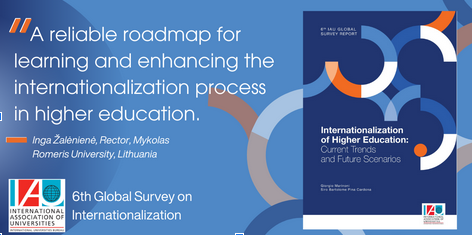
Despite geopolitical challenges, the internationalisation of higher education institutions is on the rise, - according to the 6th edition of the Global Survey on Internationalisation of Higher Education. The Future of Internationalisation of Higher Education in January 2023, conducted by the International Association of Universities. The results highlighted trends in learning and teaching and how higher education is responding to geopolitical and demographic changes in societies.
"IAU Global Survey is a reliable roadmap for learning and enhancing the internationalization process in higher education," notes Prof. Dr. Inga Žalėnienė, Rector of Mykolas Romeris University (Lithuania) and Vice-President of International Association of Universities.
Virtual internationalism
"Rapid technological, geopolitical, demographic and other changes have also affected higher education, prompting the development of new teaching and learning methodologies, new research, and highlighting the important relationship between higher education and society. Discussions on the impact of these changes on internationalisation, its nature and role, aim to focus on the societal mission of higher education," notes Prof. Dr. I. Žalėnienė.
According to the Rector, the study reveals that all these changes have affected the way people live, think and interact with each other; they have also had an impact on the world of higher education, especially on teaching and learning methodologies; they have stimulated new research and highlighted the important link between higher education and society, calling for a renewed focus on the public mission of higher education. In today's changing world, the internationalisation of higher education has also changed and some of these changes have had a positive impact on internationalisation while others have had a negative one. This has led to a debate on the nature and role of internationalisation.
77% of the survey respondents indicated that various forms of international cooperation are important to the institutions they represent. Many of them offer virtual student exchanges (69%), online courses (59%) and distance learning programmes (45%).
Guidelines for strengthening internationalisation
One of the main trends is the increasing importance of academic leaders and student mobility. It was identified by 44% of respondents as a key priority and benefit of internationalisation. Capacity building activities and sustainable development have also seen the greatest increase in importance over the last five years.
The Rector of MRU pointed out that this survey showed that academic leaders around the world are increasingly paying attention to internationalisation, especially in institutions that previously considered it of low importance. This result reverses a worrying trend of increasing inequality between higher education institutions that was highlighted in the 5th edition. The survey found that HEIs around the world see increased international cooperation and capacity building as the main benefits of internationalisation. While student mobility is still the main focus in terms of priorities, international cooperation and capacity-building activities have increased the most over the last five years.
"This shows that academic institutions around the world are becoming more aware of the benefits of internationalisation," notes Prof. Dr Inga Žalėnienė.
A total of 722 higher education institutions from 110 countries around the world submitted data to the survey. The majority of the institutions participating in the survey were small or medium-sized, with communities of around 10 000 students. More than half of the institutions in the survey were public higher education institutions, and fewer were private. All of them have all three levels of study: bachelor's, master's and doctoral. This is the sixth consecutive year the survey has been carried out.
Click here for the report.